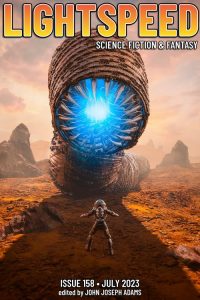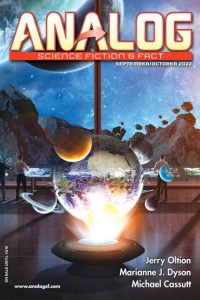Charles Payseur Reviews Short Fiction: Lightspeed and F&SF
Pushing on into July, Lightspeed opens with J.B. Park’s timely ‘‘Six Months After All Life on Titan Died’’, which is framed as a prompt for an algorithm-generated story, where the narrator is the prompter trying to coax out a marketable drama about a whistleblower and an accidental genocide. It’s a layered piece, commenting both on the ways algorithm-generated art can flatten and play into market biases and prejudices, and a statement beyond that about capitalism, debt, and tragedy. The extinction event is real in the world of the story, as is the whistleblower, but her actual story is pushed aside in favor of action and familiar tropes, the result a text that uses what should be a call to action against the corrupt practices that led to a whole alien moon being decimated and turns it into more money for the same system that caused the tragedy. There’s a lot going on, but Park keeps things focused and compelling, urging readers to pay attention both to the story itself and to the trajectory of the real world and current ‘‘AI’’ boom. Closing out the issue is Isha Karki’s ‘‘Muna in Barish’’, which takes a fantasy-tinged look at the publishing industry. Muna is a Nehirir, horned and marginalized in complex ways, assumed to be good with the earth but not with words – which makes Muna’s ambition to be a word weaver, a published author, that much more difficult and fraught. Still, she journeyed far from home to make the attempt, and found work in a bookshop with a man who seems accepting and kind, but whose actions bely less altruistic motivations. The piece follows Muna as she confronts the ways that racism and bias dictate much about the field she wants to enter, from who gets access to texts and support to who can get credited for the work they do. The worldbuilding here is nuanced and impressive, and Karki does a great job of revealing this world full of pitfalls and duplicity getting between Muna and her dreams. Especially for the writers or aspiring writers out there, this will hit hard.
The July/August F&SF starts strong with a publication debut for Kristina Ten with ‘‘Approved Methods of Love Divination in the First-Rate City of Dushagorod’’. In many ways the story is a textbook example of using an unreliable narrator, as the powers that be in Dushagorod follow Sofia’s attempts to find her soulmate through the state-sanctioned methods. And, when those don’t work, how she shamefully and criminally conspires to go outside those proscribed avenues to find her love. Ten does a wonderful job of using that voice of the city to reveal just how things might not be as first-rate as they seem, and getting readers to invest in Sofia and the increasingly precarious position the city pushes her into. DaVaun Sanders also makes an F&SF debut with ‘‘NPC (or Eight Haxploits to Maximize Your Endgame Farming: A Player’s Guide)’’. In it, Gene has already lost his mother, and violence seems to be following him, making him a spectator, a witness, again and again. And when his friend introduces him to a strange new game – a game that shifts, offers mysterious rewards, and involves real world elements – it seems like an escape. Except it’s not, as violence continues to follow, and loss continues to hound his steps. Gene finds himself teetering on the edge of something deep and dark, investing more into this game that he doesn’t even fully understand. Sanders does an excellent job balancing tension and intrigue, showing Gene’s complicated relationship to his father, to his friends, to the world around him, all while drawing him into a mystery that resolves in something strange and terribly beautiful.
The issue also cuts back a bit on poetry, featuring only two poems, both well worth checking out. Among them is ‘‘How to Pack for a Quest’’ by Mary Soon Lee, which is a rather charming bit of advice about what to bring on an adventure, avoiding perhaps the expected provisions like weapons and other tools of conflict. Instead, the piece focuses on what some might consider ‘‘softer’’ skills that can make travel easier, like negotiating and having the right tool or knowledge for the task at hand. It’s a lighter read but nicely subverts some fantasy tropes and challenges the importance of combat-first approaches to the hero’s journey in popular fantasy. Finally, Celeste Rita Baker’s story ‘‘Pedestals, Proclivities, and Perpetuities’’ is a rather absurd but also roaringly funny story about a very rich couple whose lives are changed somewhat when Mister Charlie throws Miss Ann onto their roof and she finds she likes it there. The piece follows them as they deal with her being on the roof full time, demanding more and more things be thrown up to her, as the pair moves through affairs and schemes and investments in, among others things, their company that harvests urine from poorer nations to export as a health aid and restorative. There are just so many ridiculous things going on that it reveals the ridiculousness of wealth sharply, showing how these things might as well be the case, because they are so excessive, so toxic. That even if the things here are A Lot they are no more so than the realities of wealth and the way the haves exploit the have-nots. It’s satire at its finest.
Recommended Stories:
“Muna in Barish,” Isha Karki (Lightspeed 7/23)
“Pedestals, Proclivities, and Perpetuities,” Celeste Rita Baker (F&SF 7-8/23)
Charles Payseur is an avid reader, writer, and reviewer of speculative fiction. His works have appeared in The Best American Science Fiction and Fantasy, Lightspeed Magazine, and Beneath Ceaseless Skies, among others, and many are included in his debut collection, The Burning Day and Other Strange Stories (Lethe Press 2021). He is the series editor of We’re Here: The Best Queer Speculative Fiction (Neon Hemlock Press) and a multiple-time Hugo and Ignyte Award finalist for his work at Quick Sip Reviews. When not drunkenly discussing Goosebumps, X-Men comic books, and his cats on his Patreon (/quicksipreviews) and Twitter (@ClowderofTwo), he can probably found raising a beer with his husband, Matt, in their home in Eau Claire, Wisconsin.
This review and more like it in the August 2023 issue of Locus.
 While you are here, please take a moment to support Locus with a one-time or recurring donation. We rely on reader donations to keep the magazine and site going, and would like to keep the site paywall free, but WE NEED YOUR FINANCIAL SUPPORT to continue quality coverage of the science fiction and fantasy field.
While you are here, please take a moment to support Locus with a one-time or recurring donation. We rely on reader donations to keep the magazine and site going, and would like to keep the site paywall free, but WE NEED YOUR FINANCIAL SUPPORT to continue quality coverage of the science fiction and fantasy field.
©Locus Magazine. Copyrighted material may not be republished without permission of LSFF.








